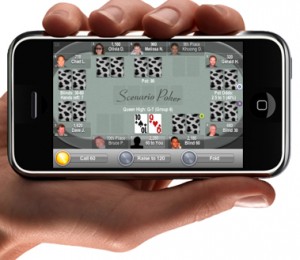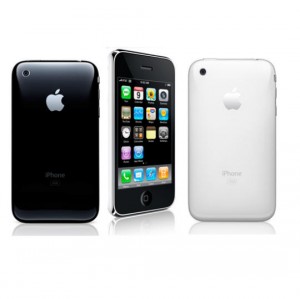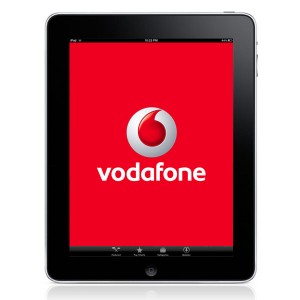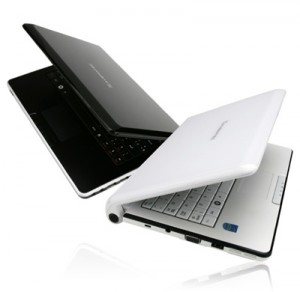Gambling Blog
Poker to Go with Your Mobile is Almost Too Good to Be True

Playing poker online for real money has become extremely popular in recent years. As more and more people get high-speed internet access in their homes, and learn how easy it is to get online and join an poker site, the popularity of internet poker just continues to grow. These days, anyone can log in and join a tournament or sit in on a quick cash game, and play against real people from all corners of the globe. Some players have had such success that they quit their day jobs and live exclusively off of their online poker winnings!
But therein lies the problem – for anyone who is not quite ready to pull up anchor and give up their working lives, it can be hard putting aside enough time to get started in the world of online poker. Playing at work is obviously not an option, so that leaves playing at home, where the whole family is competing for time online, and where other responsibilities inevitably end up coming first.
The solution is simple: play in between. Pick up an iPhone or a netbook computer, They are basically mini laptops that are designed for ultimate portability. They are small, light, and have great battery life. But are they well suited to playing online poker?
There is a misconception about mobile phones and netbook computers that says they are not powerful enough for things like games and videos, but this simply is not true. While netbooks do have less computing power than the average desktop computer, they are still miles ahead of what was standard just a few years ago, and they have more than enough power to handle internet poker software.
More importantly, many online poker sites don’t even require players to download or install anything extra in order to play. Their software is designed to run across the internet, right inside the player’s favorite web browser. This is perfect, since iPhones and netbook computers are basically designed to run online programs in this way.
To play real money internet poker on an iPhone or netbook computer, players only need to find an open Wi-Fi connection, get online, and then can log in from wherever they happen to be. Whether it’s lunch at the café on the corner, a three hour airport layover, or a study break between lectures, if you have your iPhone or netbook along, you can spend all your free time winning money by playing poker online, anytime and anywhere.


Playing poker online for real money has become extremely popular in recent years. As more and more people get high-speed internet access in their homes, and learn how easy it is to get online and join an poker site, the popularity of internet poker just continues to grow. These days, anyone can log in and join a tournament or sit in on a quick cash game, and play against real people from all corners of the globe. Some players have had such success that they quit their day jobs and live exclusively off of their online poker winnings!
But therein lies the problem – for anyone who is not quite ready to pull up anchor and give up their working lives, it can be hard putting aside enough time to get started in the world of online poker. Playing at work is obviously not an option, so that leaves playing at home, where the whole family is competing for time online, and where other responsibilities inevitably end up coming first.
The solution is simple: play in between. Pick up an iPhone or a netbook computer, They are basically mini laptops that are designed for ultimate portability. They are small, light, and have great battery life. But are they well suited to playing online poker?
There is a misconception about mobile phones and netbook computers that says they are not powerful enough for things like games and videos, but this simply is not true. While netbooks do have less computing power than the average desktop computer, they are still miles ahead of what was standard just a few years ago, and they have more than enough power to handle internet poker software.
More importantly, many online poker sites don’t even require players to download or install anything extra in order to play. Their software is designed to run across the internet, right inside the player’s favorite web browser. This is perfect, since iPhones and netbook computers are basically designed to run online programs in this way.
To play real money internet poker on an iPhone or netbook computer, players only need to find an open Wi-Fi connection, get online, and then can log in from wherever they happen to be. Whether it’s lunch at the café on the corner, a three hour airport layover, or a study break between lectures, if you have your iPhone or netbook along, you can spend all your free time winning money by playing poker online, anytime and anywhere.

Playtech Software has now 10 years of Online Gaming Excellence

Playtech is one of the world’s largest producers of online gaming software. For a decade, the company has been creating electronic games and online casino platforms for gambling providers all around the world. They have remained on the cutting edge of the industry throughout their tenure, and have developed a reputation for creativity and innovation that up-and-coming gaming software producers strive to match.
Playtech was founded in 1999, during the early years of the internet. They were not the first software company to enter the world of online gambling, so they spend a couple of years getting their feet wet before jumping in completely. In 2001, after two years of research and development, the first Playtech-powered internet casino was launched. Their software began to receive rewards right from the start, which was a huge incentive to continue their efforts.
By 2003, Playtech was already working to broaden the horizons of online gambling with the release of the world’s first Live Game system. This unique take on internet gambling made use of live video feeds of real dealers manipulating real gambling equipment. The video was then digitally incorporated into electronic casino games, creating a unique meld of online and offline gambling.
In 2006, Playtech was made public, and its shares were admitted to the London Stock Exchange. This was a time of great expansion for the company, despite complications introduced by the new UIGEA bill in the United States, which forced Playtech out of the American market. The company took the blow in stride, and simply continued to expand, branching out into related markets like online bingo and internet poker. Today, Playtech stands as one of the forerunners in the field of online gambling.
Playtech’s software gives players access to more than 140 real-money casino games. These range all across the board, from casino classics like poker, blackjack, and roulette to dozens of different video poker slot machines, each with its own theme and style. Some of their more unique games include Progressive Jackpot titles with collective prize pools that can grow into the millions, and Live Games that put a unique twist on the concept of online gambling. Playtech also hosts what might well be the most expensive slot game in existence – their 50-payline Thrill Seekers slot comes with a colorful carnival theme, and costs up to $50,000 for a single spin.
While Playtech-powered casinos cannot currently accept US players, legislation regarding online gambling in the US is on the verge of change, so things may look very different a year from now. Playtech has not suffered from the lack of exposure in the US, and is likely to embrace any changes that may come along.
In the meantime, Playtech stands as the world’s largest publically-traded provider of online casino software. Today, a full 80% of their employers work in research and design – a strong testament to their desire for innovation. The company’s motto is “Source of success” – it’s bold, and maybe even a little bit pretentious, but it certainly is appropriate.

Playtech is one of the world’s largest producers of online gaming software. For a decade, the company has been creating electronic games and online casino platforms for gambling providers all around the world. They have remained on the cutting edge of the industry throughout their tenure, and have developed a reputation for creativity and innovation that up-and-coming gaming software producers strive to match.
Playtech was founded in 1999, during the early years of the internet. They were not the first software company to enter the world of online gambling, so they spend a couple of years getting their feet wet before jumping in completely. In 2001, after two years of research and development, the first Playtech-powered internet casino was launched. Their software began to receive rewards right from the start, which was a huge incentive to continue their efforts.
By 2003, Playtech was already working to broaden the horizons of online gambling with the release of the world’s first Live Game system. This unique take on internet gambling made use of live video feeds of real dealers manipulating real gambling equipment. The video was then digitally incorporated into electronic casino games, creating a unique meld of online and offline gambling.
In 2006, Playtech was made public, and its shares were admitted to the London Stock Exchange. This was a time of great expansion for the company, despite complications introduced by the new UIGEA bill in the United States, which forced Playtech out of the American market. The company took the blow in stride, and simply continued to expand, branching out into related markets like online bingo and internet poker. Today, Playtech stands as one of the forerunners in the field of online gambling.
Playtech’s software gives players access to more than 140 real-money casino games. These range all across the board, from casino classics like poker, blackjack, and roulette to dozens of different video poker slot machines, each with its own theme and style. Some of their more unique games include Progressive Jackpot titles with collective prize pools that can grow into the millions, and Live Games that put a unique twist on the concept of online gambling. Playtech also hosts what might well be the most expensive slot game in existence – their 50-payline Thrill Seekers slot comes with a colorful carnival theme, and costs up to $50,000 for a single spin.
While Playtech-powered casinos cannot currently accept US players, legislation regarding online gambling in the US is on the verge of change, so things may look very different a year from now. Playtech has not suffered from the lack of exposure in the US, and is likely to embrace any changes that may come along.
In the meantime, Playtech stands as the world’s largest publically-traded provider of online casino software. Today, a full 80% of their employers work in research and design – a strong testament to their desire for innovation. The company’s motto is “Source of success” – it’s bold, and maybe even a little bit pretentious, but it certainly is appropriate.
Tags: blackjack, estonia, gambling software, gaming software, online gambling, online gambling in the us, playtech, progressive jackpot, roulette, software, thrill seekers slot, uigea, video poker
Blackjack Strategy with a New iPhone App

The app includes full blackjack strategy charts to help players learn how and when to take action on their cards, plus complete write-ups of official blackjack rules. The app is already getting very positive reviews, and people who have tried it out say it’s a great way for beginners to learn how to play the game.

The app includes full blackjack strategy charts to help players learn how and when to take action on their cards, plus complete write-ups of official blackjack rules. The app is already getting very positive reviews, and people who have tried it out say it’s a great way for beginners to learn how to play the game.
Tags: blackjack, blackjack app, blackjack strategy, iphone, iphone app, mobile casino, mobile casino reviews
Clonie Gowen Lawsuit against Full Tilt Poker is Dismissed!
The case between Clonie Gowen and Full Tilt Poker has been officially dismissed. Gowen, a pro poker player, said she was promised 1% of Full Tilt shares a while back. 1% of Full Tilt is estimated at about $40 million! Since there was no contract between the two parties the case was inevitably dismissed. We can still enjoy Clonie’s performance in this video though.

The case between Clonie Gowen and Full Tilt Poker has been officially dismissed. Gowen, a pro poker player, said she was promised 1% of Full Tilt shares a while back. 1% of Full Tilt is estimated at about $40 million! Since there was no contract between the two parties the case was inevitably dismissed. We can still enjoy Clonie’s performance in this video though.

Tags: clonie gowen, full tilt, lawsuit, online poker, online poker room, poker, poker babe, poker video
Vodafone Rises From an 80s Racal to an iPad 3G provider

Vodafone is the second largest mobile phone operator in the world based on subscribers, and number one based on revenue. The group is listed on the LSE and NASDAQ markets, and today has operations in 31 countries across the globe. Vodafone employs nearly 80,000 people worldwide, and caters to a subscriber base that is quickly approaching 450 million.
Like many massive companies, Vodafone has humble roots. It started out as part of a group called Racal Telecom, which was founded in 1983. At the time, Racal was one of just two operators licensed to provide mobile services in the UK (along with the now-defunct British Telecom). This early UK network was called Racal Vodafone (Voice Data FONE). It was not until 1991 that Vodafone went independent.
After a bumpy decade filled with mergers, acquisitions, and rebranding, Vodafone made telecommunications history by initializing the world’s first 3G network though Vodafone United Kingdom, setting the stage for the future of mobile communications. This marked a turning point for the company, which soon began to expand globally, becoming the network giant it is today.
Vodafone’s current offerings extend far beyond basic mobile telephone services. In 2009 the group launched Vodafone 360, providing unique mobile internet services for mobile users. Early 2010 the launch of the world’s most inexpensive mobile phone – the Vodafone 150, selling for just $15. Other current offerings include a multimedia portal service called Vodafone Live!, and a 3G USB modem allowing laptop users to browse the internet on a Vodafone 3G service plan.
The near future will see Vodafone’s services expand even further. A recent press release revealed plans to offer dedicated iPad pricing packages by late May, 2010. The iPad is not a mobile phone, but the device’s 3G capabilities will allow Vodafone subscribers to access everything from email and maps to mobile casino games on the device.
Initially, iPad 3G service plans will be offered in Australia, Germany, Italy, Spain and the UK. The iPad uses micro-sim cards, so existing Vodafone 3G subscribers will be required to amend their current contract, paying an additional monthly fee for a new sim card to get iPad service. Both montly contracts and pre-paid packages are expected to be available.
Vodafone only became a registered Apple partner this year, far behind O2 and Orange, who Vodafone will soon be competing against for iPad 3G customers. Pricing plans have yet to be announced, but are expected to come out on May 10 when international iPad preorders begin.
Keeping up with the latest trends is vital for the survival of a company like Vodafone. Company boss Vittorio Colao recently said: “Anything that improves the customer experience with mobile data is welcome and as such I would be very interested in having it.”

Vodafone is the second largest mobile phone operator in the world based on subscribers, and number one based on revenue. The group is listed on the LSE and NASDAQ markets, and today has operations in 31 countries across the globe. Vodafone employs nearly 80,000 people worldwide, and caters to a subscriber base that is quickly approaching 450 million.
Like many massive companies, Vodafone has humble roots. It started out as part of a group called Racal Telecom, which was founded in 1983. At the time, Racal was one of just two operators licensed to provide mobile services in the UK (along with the now-defunct British Telecom). This early UK network was called Racal Vodafone (Voice Data FONE). It was not until 1991 that Vodafone went independent.
After a bumpy decade filled with mergers, acquisitions, and rebranding, Vodafone made telecommunications history by initializing the world’s first 3G network though Vodafone United Kingdom, setting the stage for the future of mobile communications. This marked a turning point for the company, which soon began to expand globally, becoming the network giant it is today.
Vodafone’s current offerings extend far beyond basic mobile telephone services. In 2009 the group launched Vodafone 360, providing unique mobile internet services for mobile users. Early 2010 the launch of the world’s most inexpensive mobile phone – the Vodafone 150, selling for just $15. Other current offerings include a multimedia portal service called Vodafone Live!, and a 3G USB modem allowing laptop users to browse the internet on a Vodafone 3G service plan.
The near future will see Vodafone’s services expand even further. A recent press release revealed plans to offer dedicated iPad pricing packages by late May, 2010. The iPad is not a mobile phone, but the device’s 3G capabilities will allow Vodafone subscribers to access everything from email and maps to mobile casino games on the device.
Initially, iPad 3G service plans will be offered in Australia, Germany, Italy, Spain and the UK. The iPad uses micro-sim cards, so existing Vodafone 3G subscribers will be required to amend their current contract, paying an additional monthly fee for a new sim card to get iPad service. Both montly contracts and pre-paid packages are expected to be available.
Vodafone only became a registered Apple partner this year, far behind O2 and Orange, who Vodafone will soon be competing against for iPad 3G customers. Pricing plans have yet to be announced, but are expected to come out on May 10 when international iPad preorders begin.
Keeping up with the latest trends is vital for the survival of a company like Vodafone. Company boss Vittorio Colao recently said: “Anything that improves the customer experience with mobile data is welcome and as such I would be very interested in having it.”
Tags: apple ipad, ipad 3G, iphone casinos, mobile casino, mobile casino games, mobile casino reviews, o2, orange, sim cards, tmobile, UK provider, vittorio colao, vodafone, voice data
Web Apps and Netbook Freedom

A few years ago, the Web 2.0 revolution came riding in on a wave of technological advancements, bringing with it a fundamentally different way of thinking that has forever changed the world of personal computing. No longer are users tethered to bulky, immobile desktop PCs, tangled amongst a mass of cables and surrounded by piles of mis-labeled CDs.
Instead, small and lightweight netbook computers offer an almost sublime freedom, letting people stay connected to the world wherever they happen to be. Users can access email, communicate with friends, family and associates, or even do their personal banking from anywhere that offers a wireless internet connection.
The possibilities offered by netbook computers rely very heavily on a special sort of software that has evolved along with changes in hardware that made netbooks possible. So-called “web apps” are programs that live online, and that owe their power to software technology like Flash or Java which lets programmers embed these apps into their websites. Such apps do not need to be downloaded or installed – they just load right inside the user’s web browser. Web apps are often cross-platform, and can be accessed from virtually any computer in the world.
Web apps and netbook computers go hand-in-hand. Because netbooks offer limited computing power and meager storage space, users may find it difficult to install large programs such as full office suites or photo editing apps. Web apps, which stream their services through the internet, fill this gap nicely.
Moreover, the fact that web apps are always accessible means that netbook users are never far away from the files and the programs they need. Users only need to get online from wherever they happen to be, and everything they need becomes available right away.
Today, there is a “web app” version of just about every piece of software that a person might normally install on their desktop PC. Online programs are available that offer advanced word processing, spreadsheet, and database capabilities. Users can edit and resize photographs, create videos, compose presentations, and play games.
Even the world of online gambling has embraced the concept of web apps. Many internet casinos now offer “no download” versions of their best online casino games. These no download casinos let players connect to their accounts through their netbook computers to play real-money games and participate in multiplayer events like online casino free tournaments.
While the future of personal computing cannot be predicted, it seems that netbooks and web apps represent the beginning of a major wave of change. The move towards wireless systems, cloud computing networks, and web-centric software has only just begun, and as technology allows computing to become more and more portable, the possibilities can only increase.

A few years ago, the Web 2.0 revolution came riding in on a wave of technological advancements, bringing with it a fundamentally different way of thinking that has forever changed the world of personal computing. No longer are users tethered to bulky, immobile desktop PCs, tangled amongst a mass of cables and surrounded by piles of mis-labeled CDs.
Instead, small and lightweight netbook computers offer an almost sublime freedom, letting people stay connected to the world wherever they happen to be. Users can access email, communicate with friends, family and associates, or even do their personal banking from anywhere that offers a wireless internet connection.
The possibilities offered by netbook computers rely very heavily on a special sort of software that has evolved along with changes in hardware that made netbooks possible. So-called “web apps” are programs that live online, and that owe their power to software technology like Flash or Java which lets programmers embed these apps into their websites. Such apps do not need to be downloaded or installed – they just load right inside the user’s web browser. Web apps are often cross-platform, and can be accessed from virtually any computer in the world.
Web apps and netbook computers go hand-in-hand. Because netbooks offer limited computing power and meager storage space, users may find it difficult to install large programs such as full office suites or photo editing apps. Web apps, which stream their services through the internet, fill this gap nicely.
Moreover, the fact that web apps are always accessible means that netbook users are never far away from the files and the programs they need. Users only need to get online from wherever they happen to be, and everything they need becomes available right away.
Today, there is a “web app” version of just about every piece of software that a person might normally install on their desktop PC. Online programs are available that offer advanced word processing, spreadsheet, and database capabilities. Users can edit and resize photographs, create videos, compose presentations, and play games.
Even the world of online gambling has embraced the concept of web apps. Many internet casinos now offer “no download” versions of their best online casino games. These no download casinos let players connect to their accounts through their netbook computers to play real-money games and participate in multiplayer events like online casino free tournaments.
While the future of personal computing cannot be predicted, it seems that netbooks and web apps represent the beginning of a major wave of change. The move towards wireless systems, cloud computing networks, and web-centric software has only just begun, and as technology allows computing to become more and more portable, the possibilities can only increase.
Tags: free games, free tournaments, mobile, mobile casinos, mobile computing, netbook, netbook computers, no download casinos, online casino, web 2.o, web applications, web apps
The Story of Rafael Nadal “Rafa”s Success

Spanish tennis superstar Rafael Nadal, nicknamed “Rafa”, will step out onto the clay today at the 2010 Monte-Carlo Masters, making his debut in the 103rd iteration of this annual event. For the past five years, Nadal has played in this ATP Masters Series tournament, and each of those years, he won first place in the single title. Now he’s at it again, battling against last year’s finalist Novak Djokovic and wild card entry Andy Murray, hoping to break a world tennis record by grabbing his sixth straight Masters title.
Nadal, 23, is entering this year’s Monte-Carlo Masters with a 29-1 career record, and is walking proud with 27 straight wins since he lost to Guillermo Coria in 2003. Today he will be playing his 201st ATP World Tour Masters 1000 match – an astonishing number for a player his age. Nadal stands tall at 6’1”, and is a very imposing figure on the court. His aggressive play style and massive forehand make him a formidable player.
He began playing tennis when he was three years old. Right away his uncle Toni, a former tennis pro, recognized the youngster’s talent for the game; Toni has been coaching him ever since. Nadal won his first championship when he was eight, which made him work even harder at training and practicing. Around this time, Toni began encouraging him to play left-handed (Nadal is naturally right-handed), a move which would give him an advantage on the court. He still uses this strategy today.
As a teen, Nadal was also an adept football player, and was heavily involved in both sports. His father, concerned about the boy’s academic future, forced him to choose just one. Obviously, Nadal chose tennis. The choice paid off, and by the age of 17, Nadal was already ranked among the 50 best tennis players in the world.
His entrance into the pro circuit was met with some criticism – not because of how Nadal played, but because of how he looked. His propensity to wear sleeveless shirts, below-the-knee trousers and a bandana drew endless mocking from the press. One television commenter even joked that he showed up to a game wearing his sister’s clothes. Nadal shrugged the jokes off, and went on to play like a champ.
Nadal’s career exploded in 2005 when he dominated the spring clay court season, winning 25 consecutive matches and establishing himself as a force to be reckoned with. This year earned him the ATP Most Improved Player of the Year award. By now Nadal was ranked number 5 in the world, making him the youngest player to make it into the Top 10 since Andrei Medvedev in 1993.
The years since have been a battle against injuries forcing off-court time here and there, but overall his path of progress has been a steep climb towards the top. Now, Nadal is confident that he will claim his 6th straight Monte-Carlo Masters title this year. His primary adversary Roger Federer is not playing this year, giving Nadal a good chance of fulfilling his goal. “I’ve always been a winner”, Nadal says in an official press release. “And will soon be one again!”
Whether players favor Nadal or his competition for this year’s title, now is the time to put money down. Bettors in France across Europe are advised to use Bet365 Sports, while those in the US should check out Bodog, Brobury Sports or BetUS Sportsbook. Each of these trusted online sportsbooks offers their own odds and lines, players may want to shop around to find a system that most benefits them.

Spanish tennis superstar Rafael Nadal, nicknamed “Rafa”, will step out onto the clay today at the 2010 Monte-Carlo Masters, making his debut in the 103rd iteration of this annual event. For the past five years, Nadal has played in this ATP Masters Series tournament, and each of those years, he won first place in the single title. Now he’s at it again, battling against last year’s finalist Novak Djokovic and wild card entry Andy Murray, hoping to break a world tennis record by grabbing his sixth straight Masters title.
Nadal, 23, is entering this year’s Monte-Carlo Masters with a 29-1 career record, and is walking proud with 27 straight wins since he lost to Guillermo Coria in 2003. Today he will be playing his 201st ATP World Tour Masters 1000 match – an astonishing number for a player his age. Nadal stands tall at 6’1”, and is a very imposing figure on the court. His aggressive play style and massive forehand make him a formidable player.
He began playing tennis when he was three years old. Right away his uncle Toni, a former tennis pro, recognized the youngster’s talent for the game; Toni has been coaching him ever since. Nadal won his first championship when he was eight, which made him work even harder at training and practicing. Around this time, Toni began encouraging him to play left-handed (Nadal is naturally right-handed), a move which would give him an advantage on the court. He still uses this strategy today.
As a teen, Nadal was also an adept football player, and was heavily involved in both sports. His father, concerned about the boy’s academic future, forced him to choose just one. Obviously, Nadal chose tennis. The choice paid off, and by the age of 17, Nadal was already ranked among the 50 best tennis players in the world.
His entrance into the pro circuit was met with some criticism – not because of how Nadal played, but because of how he looked. His propensity to wear sleeveless shirts, below-the-knee trousers and a bandana drew endless mocking from the press. One television commenter even joked that he showed up to a game wearing his sister’s clothes. Nadal shrugged the jokes off, and went on to play like a champ.
Nadal’s career exploded in 2005 when he dominated the spring clay court season, winning 25 consecutive matches and establishing himself as a force to be reckoned with. This year earned him the ATP Most Improved Player of the Year award. By now Nadal was ranked number 5 in the world, making him the youngest player to make it into the Top 10 since Andrei Medvedev in 1993.
The years since have been a battle against injuries forcing off-court time here and there, but overall his path of progress has been a steep climb towards the top. Now, Nadal is confident that he will claim his 6th straight Monte-Carlo Masters title this year. His primary adversary Roger Federer is not playing this year, giving Nadal a good chance of fulfilling his goal. “I’ve always been a winner”, Nadal says in an official press release. “And will soon be one again!”
Whether players favor Nadal or his competition for this year’s title, now is the time to put money down. Bettors in France across Europe are advised to use Bet365 Sports, while those in the US should check out Bodog, Brobury Sports or BetUS Sportsbook. Each of these trusted online sportsbooks offers their own odds and lines, players may want to shop around to find a system that most benefits them.
Tags: atp, bet on tennis, bet365, betus, bodog sports, monte carlo masters, monte carlo tennis odds, online sportbook, raf, rafa, rafael nadal, spanish tennis player, sports betting, tennis, tennis superstar
Watch the world’s most intense poker matches at Full Tilt Poker
The durrrr Challenge on Full Tilt Poker
Challenger: Tome “durrrr” Dwan
Players: Phil Ivey, Patrik Antonius, David Benyamine
Pot: $2 Million (durrrr’s $1.5 million to given players $500,000)
The durrrr Challenge on Full Tilt Poker
Challenger: Tome “durrrr” Dwan
Players: Phil Ivey, Patrik Antonius, David Benyamine
Pot: $2 Million (durrrr’s $1.5 million to given players $500,000)
Tags: david benyamine, durrrr challenge, ful, full tilt, full tilt poker, online poker, patrick antonius, phil ivey, poker, poker match, poker tournament
Nadal aims for sixth straight Monte-Carlo Masters title
Tags: bet on tennis, bet365, betus, bodog, brobury, masters title, monte carlo, nada, nadal, nadal sixth, rafa, rafael nadal, sportbook in france, sportsbetting, tennis, tennis odds
Eco Friendly Casino Promotions
 The eco-friendly loyalty programme at CasinoShare is aimed at rewarding and entertaining you every time you play – all whilst supporting and promoting the Global drive to “Go Green”. Every month the casino features a specific go green theme with hints and tips on how to make a difference, as well as PLAY GREEN promotions where everyone’s a winner!
The eco-friendly loyalty programme at CasinoShare is aimed at rewarding and entertaining you every time you play – all whilst supporting and promoting the Global drive to “Go Green”. Every month the casino features a specific go green theme with hints and tips on how to make a difference, as well as PLAY GREEN promotions where everyone’s a winner!
It’s Kinder to Kindle – 4 Players to win a WIRELESS BOOK READER!
Purchase and Wager 250 credits on any Monday in April and May to qualify
Now you can carry a whole library of 1,500 books on one slim and lightweight reader. Your books will be delivered wirelessly in less than 60 seconds, with no PC required. There are over 450,000 popular books, including 101 of 112 New York Times® Best Sellers, plus U.S. and international newspapers, magazines, and blogs. You can even download and read the first chapters for free before you decide to buy!
Using a Kindle to read rather than buying books is kinder to the environment as each book has a zero footprint on the planet (as no trees need to be cut down). That’s why it’s Kinder to Kindle!
 The eco-friendly loyalty programme at CasinoShare is aimed at rewarding and entertaining you every time you play – all whilst supporting and promoting the Global drive to “Go Green”. Every month the casino features a specific go green theme with hints and tips on how to make a difference, as well as PLAY GREEN promotions where everyone’s a winner!
The eco-friendly loyalty programme at CasinoShare is aimed at rewarding and entertaining you every time you play – all whilst supporting and promoting the Global drive to “Go Green”. Every month the casino features a specific go green theme with hints and tips on how to make a difference, as well as PLAY GREEN promotions where everyone’s a winner!
It’s Kinder to Kindle – 4 Players to win a WIRELESS BOOK READER!
Purchase and Wager 250 credits on any Monday in April and May to qualify
Now you can carry a whole library of 1,500 books on one slim and lightweight reader. Your books will be delivered wirelessly in less than 60 seconds, with no PC required. There are over 450,000 popular books, including 101 of 112 New York Times® Best Sellers, plus U.S. and international newspapers, magazines, and blogs. You can even download and read the first chapters for free before you decide to buy!
Using a Kindle to read rather than buying books is kinder to the environment as each book has a zero footprint on the planet (as no trees need to be cut down). That’s why it’s Kinder to Kindle!
Tags: casino bonus, casino care, casino share, eco friendly casino, go green, green, jackpotfinder, kindle, loyalty programme, online casino promotions, play green










